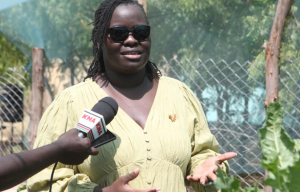Most nomadic communities in the country have, for the longest time, been traditionally pastoralists, where they rear and keep their livestock while at the same time moving from one point to another in search of pasture and water.
With prolonged droughts in recent years, many of the livestock keepers have lost millions of their livestock to hunger and diseases as the effects of climate change continue to bite.
Those who have been lucky enough to still have their animals alive have also been threatened by banditry and cattle rustling as communities fight for scarce resources to maintain their livelihoods.
While some people in these communities have ventured into farming as an alternative source of livelihood, being in the arid and semi-arid areas, there have been unreliable rains to sustain their crops to maturity where they can harvest good yields.
In order to mitigate some of these challenges, Yathrib Primary School in Garissa, with support from 4BM and M-lugha organisations, has come up with an innovative way of planting crops and vegetables using cone gardens.
The school project has yielded several harvests that have been used in the school and also shared with the parents.
Speaking during the official handover of the project to the school, Sheila Kidenda, project manager at 4BM, said that the project aims at empowering the pupils and the surrounding communities to use smart technology to grow kale, spinach, and other crops in their home gardens.
“We did this as a pilot programme in Yathrib primary school, and we are looking at expanding to other schools. We picked Garissa County because it is an arid area, and ideally such plants do not do well here, so by setting up the garden in the school, we have been able to come in and set up, and it has been successful,” Kidenda said.
“We wanted to empower the community such that people can easily plant sukuma or spinach in their house compounds, schools, or gardens and use smart technology,” she added.
Kidenda said that through knowledge sharing, parents have been able to attend some training in the school on the project to see and learn how they can make their own setups at their home farms.
Evans Kenga, a teacher at the school who has been in charge of the project, said that he has been teaching the students there, and they have been very eager to learn about smart farming.
“We have been doing agriculture practical lessons here, and our pupils have been able to learn. Some of them had not seen these seedlings, but after exposure, they had the zeal to start farming. With learners, it is very easy because they are eager to know what is going on,” Kenga said.
Kipruto Silas, who came up with the idea, says it was because the land in his home was small and needed a way to maximise its output and increase farming production.
Kipruto said that with the cone method of gardening, hundreds of seedlings can be planted in an area where normally only a few seedlings would be accommodated.
“With this technology, a small area where you could initially plant 10 seedlings, you can now plant hundreds of them. It also reduces the amount of water which would be used to sustain the crops because now only 20 litres are needed to water one corn garden per day,” Kipruto said.
“This method of planting also reduces labour because, for example, when you bring the vegetables into one small space, then you reduce the labour,” he added.
He said that they make the cone gardens from high-density polyethylene (HDPE) material, which are measured to a circumference of 15 feet for the lower part and reduced by two feet as they raise the garden up so as to leave a space for planting.
Despite water challenges, smart farming in the Northeastern region can significantly improve agricultural productivity.
By incorporating water-efficient technologies and adopting climate-smart farming practices, farmers can improve their productivity and resilience to climate change.
Community collaboration and support from government agencies and NGOs are also crucial in making these practices accessible and sustainable.
By Erick Kyalo










